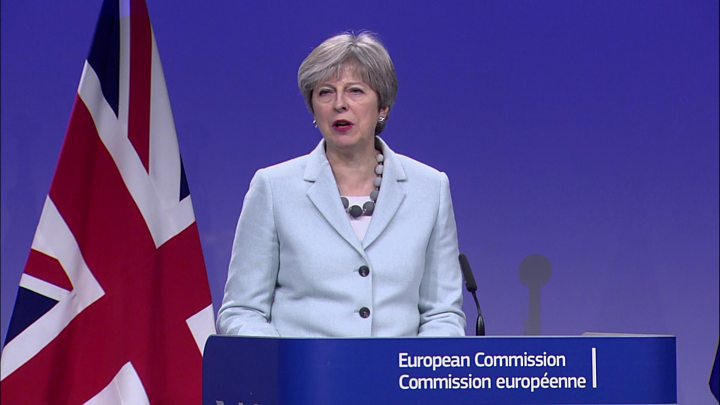
PM Theresa May has struck a last minute deal with the EU in a bid to move Brexit talks on to the next phase.
There will be no “hard border” with Ireland and EU citizens in the UK, and UK citizens in the EU, will see their rights protected.
The so-called “divorce bill” will amount to between £35bn and £40bn, the BBC understands.
The European Commission president said it was a “breakthrough” and he was confident EU leaders will approve it.
- Full text of the EU-UK statement
- ‘More Brexit work to be done’ warns Foster
- Sturgeon welcomes Brexit talks progress
- CBI: Business needs more Brexit clarity
- Brexit: All you need to know
They are due to meet next Thursday for a European Council summit and need to give their backing to the deal if post-Brexit trade talks are to begin.
The UK will then have about a year to hammer out an agreement on future relations, which will have to be ratified by the EU nations and the UK Parliament, before the UK leaves in March 2019.
Northern Ireland’s Democratic Unionist Party, whose opposition on Monday led to talks breaking down, said there was still “more work to be done” on the border issue and how it votes on the final deal “will depend on its contents”. Mrs May depends on the party’s support to win key votes in Westminster.
The pound was trading at a six-month high against the euro as news broke of the draft agreement.
What has been agreed?
- Guarantee that there will be “no hard border” between Northern Ireland and the Republic maintaining “constitutional and economic integrity of the United Kingdom”
- EU citizens living in the UK and vice versa will have their rights to live, work and study protected
- Financial settlement – no specific figure but broad agreement on principles
The Irish border – and regulatory alignment
The joint report agreed by Mrs May and Mr Juncker states, that if a trade deal cannot be agreed, the UK will maintain “full alignment” with elements of the EU single market and customs union mentioned in the Good Friday agreement.
That means on issues such as agriculture and energy the whole of the UK would continue to abide by EU rules.
Some in the DUP would have liked to remove “full alignment” from the report altogether, but that would not have been acceptable to the Irish government, says the BBC’s Chris Morris.
It is a fallback position, he adds, and the detail of how it might be done remains to be negotiated, and is likely to be highly controversial.
“But one thing is clear – there is no partial membership of the single market and the customs union on offer. Other EU member states wouldn’t accept it”, says Chris Morris
Citizens’ rights
Mrs May said that EU citizens in the UK would have their rights “enshrined in UK law and enforced by British courts”.
But the agreement also says the European Court of Justice will continue to have a role in overseeing their rights for eight years after Brexit, a move which may concern some Brexiteers. Guarantees will also apply to UK citizens living in other EU countries.
The divorce bill
Theresa May said it would be “fair to the British taxpayer” and would mean the UK in future “will be able to invest more in our priorities at home, such as housing, schools and the NHS.”
EU Brexit negotiator Michel Barnier said EU had agreed to drop the cost of relocating UK-based EU agencies from the final divorce bill.
Leaked EU guidelines on future relationship
The UK will remain a “member” of the EU’s customs union and single market during any transition period after March 2019, according to a leaked copy of European Council guidelines for the forthcoming trade talks.
The guidelines, which are a separate document to the draft agreement on divorce issues, also suggest the UK will remain under the full jurisdiction of the European Court of Justice during the transition.
Membership of the single market means keeping all of the EU’s “four freedoms” – goods, services, capital, and labour – although the UK government says that new long-term arrivals from the EU will have to register during the transition period.
Membership of the customs union restricts the UK’s ability to sign new trade deals – but informal negotiations with other countries could still be possible.
Theresa May has asked for a transition period of “around two years” during which the UK will continue to follow the “existing structure of EU rules and regulations”.
But she has also told MPs the UK will leave the single market and customs union in March 2019 and freedom of movement “as we know it” will end.
What has changed since Monday?
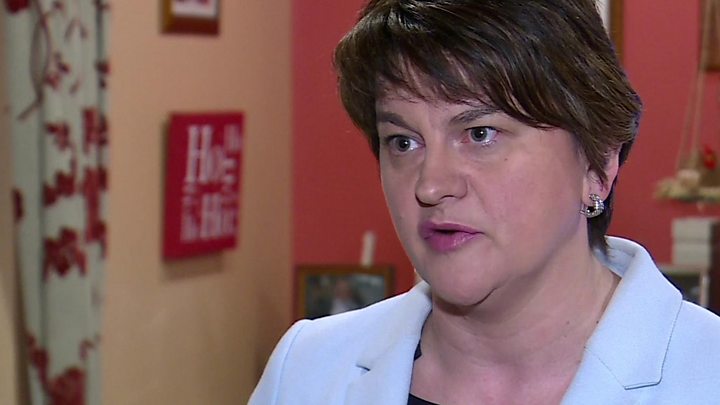
The DUP, whose opposition on Monday led to talks breaking down, say there have been six “substantial changes” to the text.
In a crucial passage, which appears to have been added to satisfy DUP concerns, it states that “no new regulatory barriers” will be allowed between Northern Ireland and the rest of the UK, and that the province’s businesses will continue to have “unfettered access” to the UK internal market.
Party leader Arlene Foster said they would mean there was “no red line down the Irish Sea” – meaning no customs barrier between Northern Ireland and the rest of the UK.
BBC political editor Laura Kuenssberg’s analysis
Image copyright
AFP
Theresa May has achieved what she wanted – the green light to move on. Had she not, she was in deep, deep political trouble.
But the 15 pages, described as a “personal success” for Theresa May by Donald Tusk in the last few minutes, give her what she needed for now.
There are additional guarantees for Northern Ireland and the border, but an undefined statement on “full alignment”, if there is no big trade deal.
The implications of what “full alignment” will mean will still be fought over by the two wings of the Conservative Party.
How has it been received?
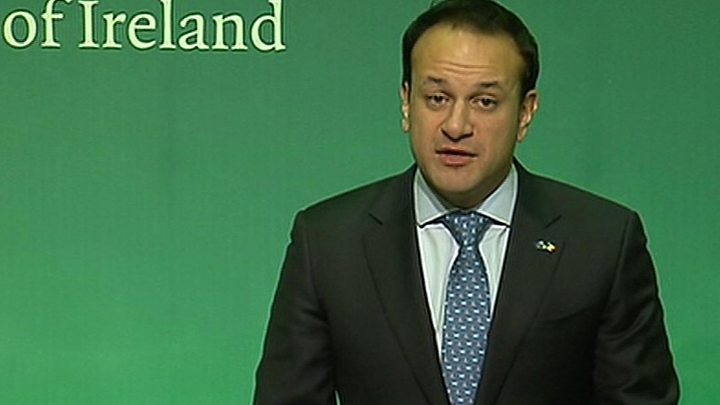
In the UK, ministers lavished praise on the prime minister with Environment Secretary Mr Gove saying it was a “significant personal political achievement” for Mrs May while Foreign Secretary Boris Johnson tweeted: “Congratulations to PM for her determination in getting today’s deal.”
But Labour’s Brexit spokesman Sir Keir Starmer said Mrs May should “seriously reflect on her approach to the negotiations so far”.
He added : “Despite being two months later than originally planned, it is encouraging that the European Commission has recommended sufficient progress in the Brexit negotiations.
“The priority for both sides now must be to agree transitional arrangements on the same basic terms as we have now. That means staying in the single market and a customs union for a time-limited period.”
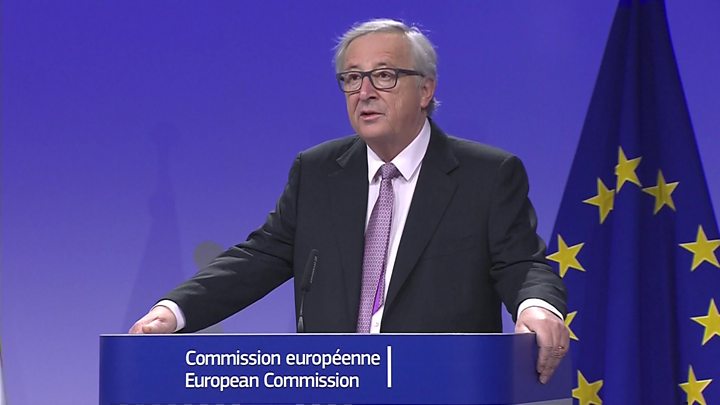
DUP Leader Arlene Foster said it meant that Northern Ireland would “not be separated constitutionally, politically, economically or regulatory from the rest of the United Kingdom” and “in all circumstances the United Kingdom will continue to ensure the same unfettered access for Northern Ireland’s businesses to the whole of the UK internal market”.
Scotland’s First Minister Nicola Sturgeon tweeted: “Move to phase 2 of talks is good – but the devil is in the detail and things now get really tough.”
Lib Dem leader Vince Cable, who backs a referendum on the final deal, said “it reduces the risk of a catastrophic no-deal Brexit” but questioned if it would last or be “torn apart by Theresa May’s own MPs”.
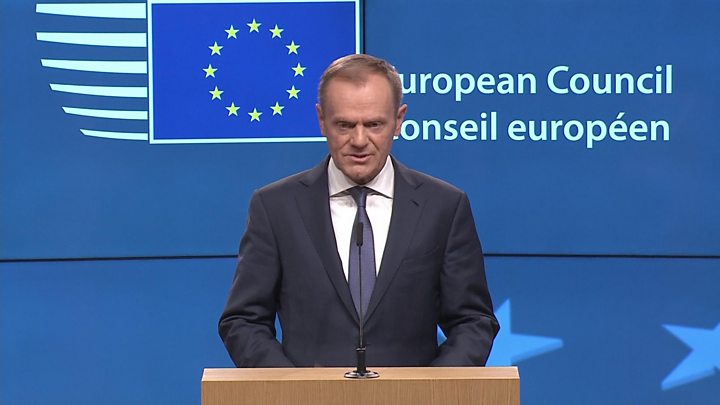
Brexit: ‘Breakthrough’ deal paves way for future trade talks

